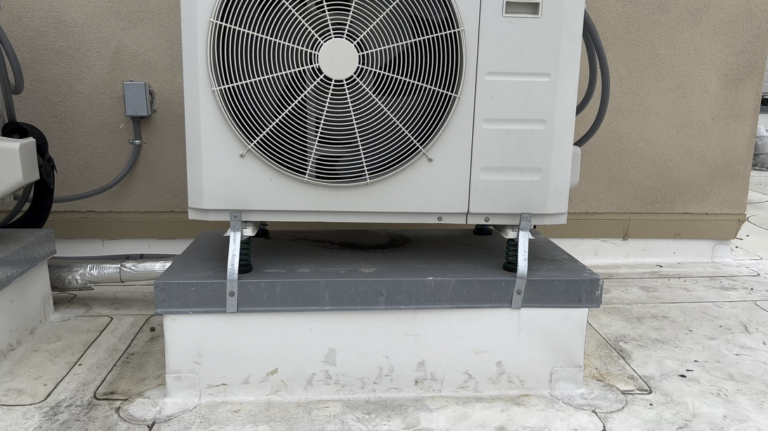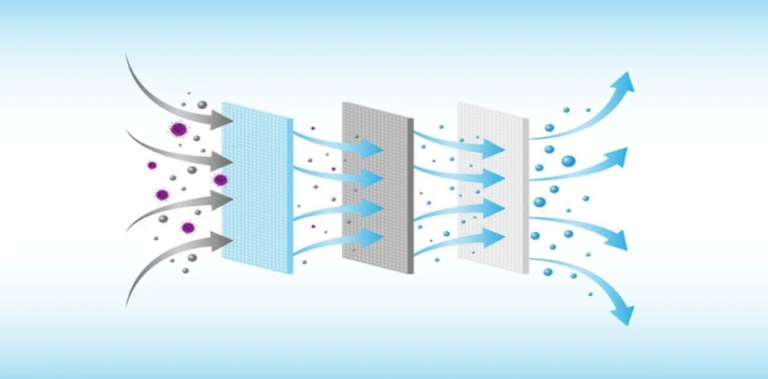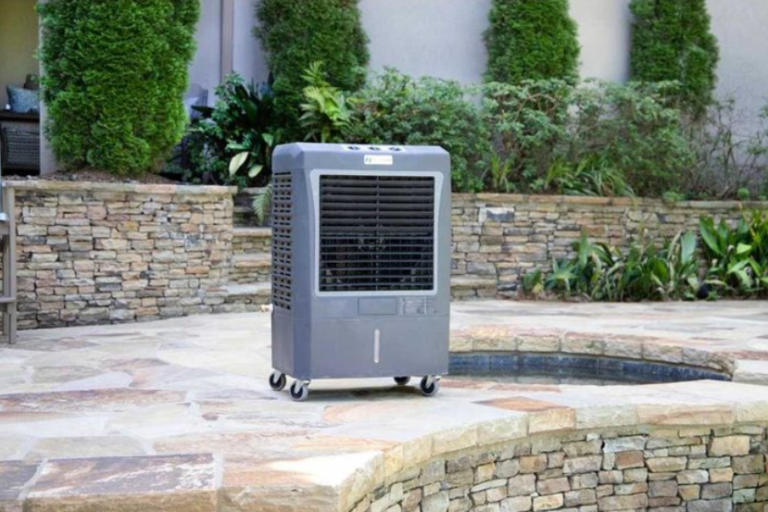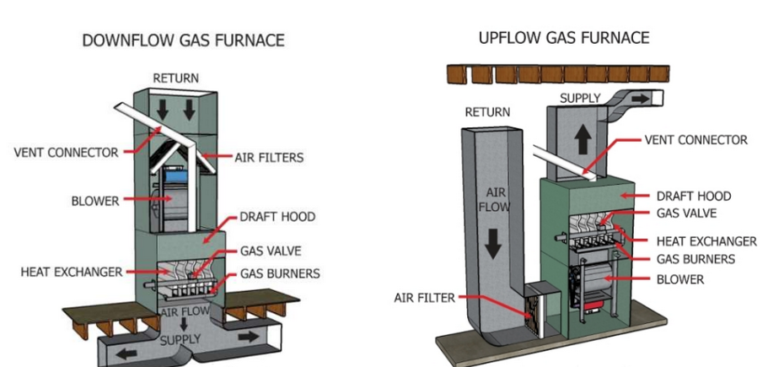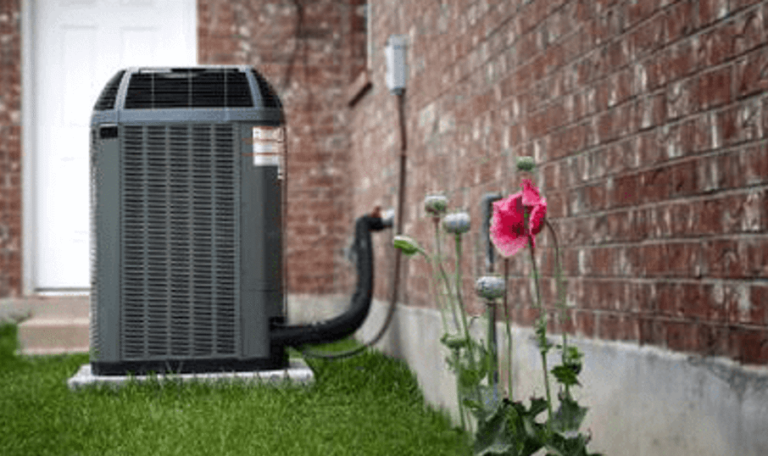How does an AC Compressor Work? Info & Fixes
An air conditioner compressor is a vital component to your AC system, and it is responsible for circulating refrigerant throughout your unit. The compressor is what gives your AC its cooling power. Here’s a closer look at how it works:
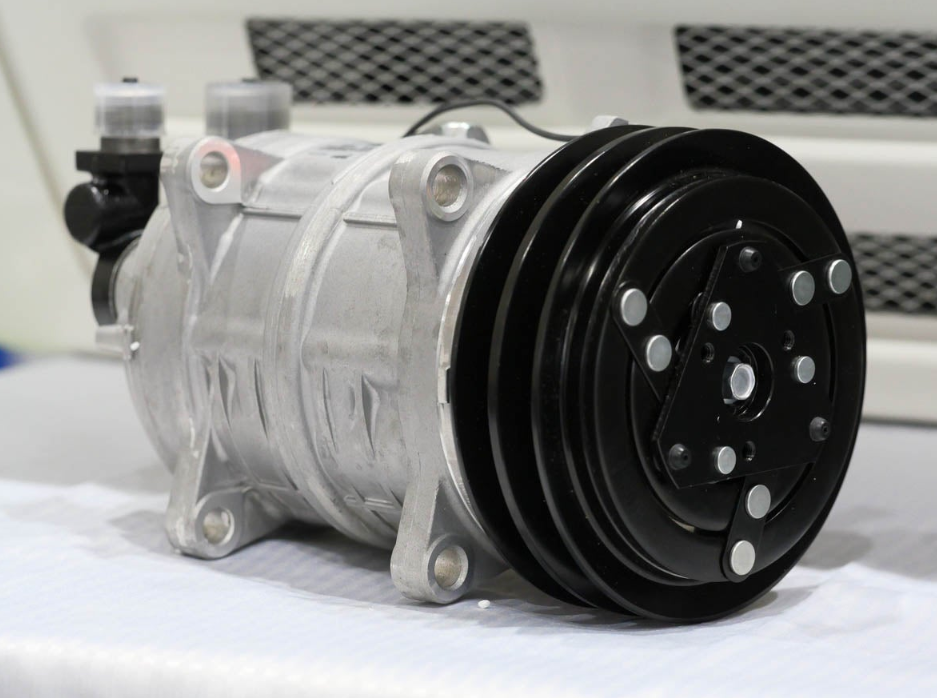
How the AC Refrigerant Works
To understand how an AC compressor works, you first need to know a little bit about refrigerant. This is the substance that helps cool the air in your home. It’s a chemical compound that evaporates at low temperatures and condenses at high temperatures. As it evaporates, it takes heat with it, which is why it’s so effective at cooling things down.
When you first turn on your AC, the refrigerant is in a liquid state. The compressor’s job is to pump this liquid refrigerant through the system so that it can start the cooling process.
How does and AC Compressor Work? Step by Step Explanation
1. The compressor is powered by an electric motor, and it works by compressing the refrigerant gas. This increases the pressure of the gas, which in turn raises its temperature. As the refrigerant passes through the compressor, it becomes very hot.
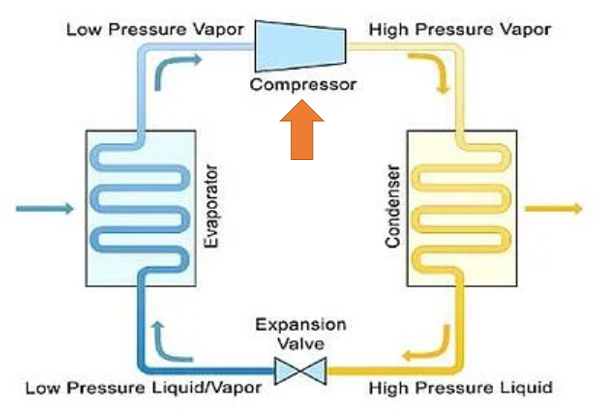
2. Next, the hot refrigerant gas travels to the condenser coils. These are located outside your home, and they help release the heat into the air. This causes the refrigerant to turn back into a liquid.
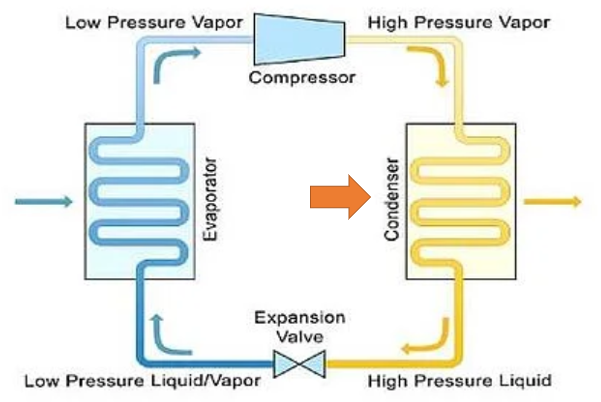
3. From there, the liquid refrigerant moves to the expansion valve. This valve regulates how much refrigerant flows into the evaporator coils. These coils are located inside your home, and they absorb heat from the air. This causes the refrigerant to evaporate, and as it does, it cools down the air in your home.
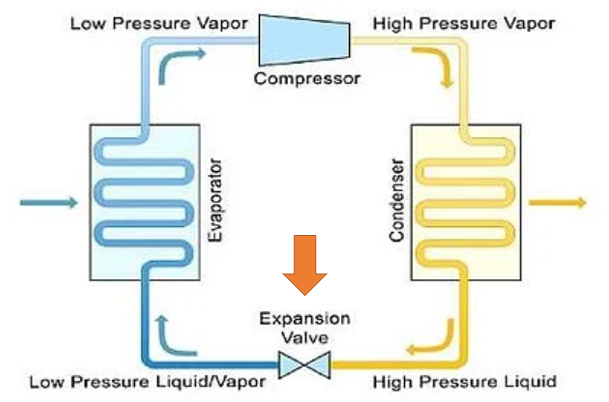
4. Finally, the refrigerant gas goes back to the compressor to start the cycle all over again.
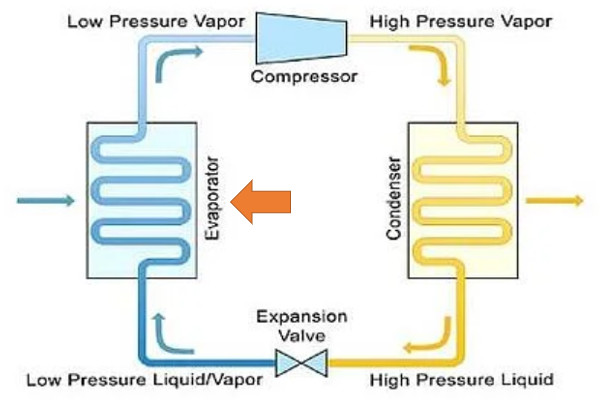
Maintaining your AC compressor
As the weather starts to heat up, it’s important to make sure your AC compressor is in good working condition. Here are a few tips on how to maintain your AC compressor:
- Check the air filter monthly and replace it as needed. A dirty air filter can restrict airflow and cause the compressor to overheat.
- Keep the area around the compressor clean and free of debris. This will help ensure adequate airflow and prevent the unit from overloading.
- Inspect the compressor regularly for any signs of wear or damage. If you notice anything unusual, contact a professional for repair or replacement
- Make sure the unit is properly lubricated according to the manufacturer’s instructions. This will help prolong its life and keep it running smoothly.
- Have the system serviced by a professional every year. This will ensure that all components are in good working order and catch any potential problems before they become serious.
By following these simple tips, you can help keep your AC compressor running efficiently for years to come.
AC Compressor: Possible issues
Related post: 15 Most Common AC Problems and How to Solve Them
It’s important to be aware of the different issues that can affect your compressor, so you can take steps to prevent them from happening.
Here are 10 possible AC compressor issues to watch out for:
1) Compressor Overheating
The compressor is responsible for circulating refrigerant throughout your AC system. If it overheats, it can cause the refrigerant to break down, which can lead to costly repairs.
2) Compressor Leaks
If your AC compressor is leaking, it’s important to take action quickly to prevent further damage to your air conditioning unit. A leaky compressor can cause your AC unit to break down, costing you money in repairs or replacement.
There are several reasons why your AC compressor may be leaking.
- The most common reason is a problem with the seals. Over time, the seals in your AC compressor can wear out or become damaged, allowing refrigerant to escape.
- Another potential cause of a leaky compressor is a crack in the housing. This can happen if your AC unit is old or has been subject to a lot of wear and tear.
If you notice that your AC compressor is leaking, the first thing you should do is turn off your AC unit. This will prevent further damage to the compressor and give you time to assess the situation.
Next, you’ll want to check the seals to see if they are damaged or worn out. If so, you’ll need to replace them. If the housing is cracked, you’ll need to replace the entire compressor.
Replacing an AC compressor can be a difficult and expensive task, so it’s best to avoid this if possible.
To prevent your compressor from leaking, make sure to have it serviced regularly by a qualified technician. This will ensure that the seals are in good condition and that any potential problems are caught early on.
3) Faulty Thermostat
If your thermostat isn’t working properly, it may not be sending the correct signal to your compressor. As a result, your compressor may turn on and off more frequently than necessary, which can lead to premature wear and tear.
If you suspect that your thermostat is the problem, there are a few things you can do to check it. First, make sure that the batteries are fresh. If they’re not, replace them and see if that fixes the issue.
Next, check the thermostat settings to make sure they’re correct for the current temperature outside. If they’re not, adjust them accordingly.
If neither of these solutions works, it’s time to call in a professional. They can test the thermostat and other parts of the AC system to diagnose the problem and recommend a solution.
4) Clogged Air Filter
A clogged air filter is one of the most common issues that can cause your AC compressor to fail. The air filter is responsible for keeping the air inside your home clean and free of contaminants.
When it becomes clogged, it can no longer do its job properly. This can cause the air inside your home to become dirty and can even lead to health problems for you and your family.
The first thing you need to do if you think your air filter is clogged is to check it. Most filters are located in the return air duct or near the furnace.
To check the filter, simply remove it from its location and hold it up to a light. If you can see light passing through the filter, then it is still clean and does not need to be replaced. However, if the filter is dark and full of dirt, then it needs to be replaced as soon as possible.
Replacing a clogged air filter is a simple process that anyone can do. First, you will need to purchase a new filter from your local hardware store or online.
Be sure to get the right size filter for your AC unit. Once you have the new filter, simply remove the old one and insert the new one in its place. Make sure that the new filter is facing the correct direction so that it can work properly.
If you find that your AC compressor is still not working after replacing the air filter, then there may be another issue causing the problem. It is always best to consult with a professional AC repairman to diagnose and fix any other issues that may be present.
5) Refrigerant Charge Issues
If there’s not enough refrigerant in your AC system, it can cause the compressor to overheat and eventually fail.
On the other hand, if there’s too much refrigerant, it can put unnecessary stress on the compressor and other parts of the system. It’s important to have a licensed professional charge your system with the correct amount of refrigerant.
If you think you may have a refrigerant charge or leak issue, it’s important to call an HVAC professional right away. Trying to fix the problem yourself could make it worse and could even be dangerous.
6) Incorrectly Sized AC Unit
If your home’s air conditioner is not cooling your home like it should, one possible explanation is that it is the wrong size for your home.
An AC unit that is too large or too small for your home will not operate efficiently, and this can lead to a number of problems, including incorrect cooling, increased energy costs, and shortened AC unit lifespan.
It’s important to have a professional contractor help you select the right sized AC unit for your home. They will take into account the square footage of your home, the number of rooms, the insulation, and other factors when making their recommendation.
Once you have the correctly sized AC unit installed, you should notice an immediate difference in how well it cools your home and how much money you are spending on energy each month.
7) Poorly Maintained AC Unit
An AC compressor is a vital component to your air conditioning system, and if it isn’t maintained properly, it can lead to a number of issues. From decreased efficiency to complete failure, there are a number of ways that a poorly maintained AC unit can impact your home or business.
To avoid these issues, it’s important to have your AC compressor serviced regularly. This involves cleaning the unit and checking for any wear and tear.
It’s also important to make sure that the unit is properly lubricated, as this will help to keep the moving parts working smoothly. By taking these simple steps, you can help to extend the life of your AC compressor and avoid costly repairs.
8) Electrical Issues
If your AC compressor isn’t working, there could be a number of issues causing the problem. In this blog post, we’ll go over some of the most common electrical issues that can cause your AC compressor to fail.
- The first thing to check is the circuit breaker or fuse that supplies power to the compressor. If this is tripped or blown, it will prevent the compressor from starting. Resetting the breaker or replacing the fuse should fix the problem.
- Next, check for loose wires or terminals at the compressor. If any of the wires are loose, they may not be getting enough power to the compressor. Tightening or replacing the wires should fix the problem (call an electrician for that)
- Another possibility is that the start capacitor is faulty. The start capacitor helps the compressor get started by providing a boost of electricity. If it’s not working properly, the compressor may not be able to start.
It’s always best to call a qualified technician to diagnose and repair the problem.
9) Damaged Parts
If your air conditioner compressor is having issues, it could be due to any number of damaged parts. In this blog post, we’ll take a look at some of the most common damaged parts that can cause problems for your AC compressor.
The compressor
One of the most common damaged parts is the compressor itself. If your compressor is damaged, it may not be able to properly pump refrigerant through your AC system. This can lead to a variety of problems, including reduced cooling capacity and increased energy consumption.
Condenser coil
Another common issue is a damaged condenser coil. The condenser coil is responsible for dissipating heat from the refrigerant. If it is damaged, it may not be able to adequately cool the refrigerant, which can cause the compressor to overheat and fail.
Evaporator coil
Another potential problem is a damaged evaporator coil. The evaporator coil is responsible for absorbing heat from the air inside your home. If it is damaged, it may not be able to adequately cool the air, which can lead to increased energy consumption and reduced cooling capacity.
If you suspect that any of these parts are causing problems for your AC compressor, it’s important to have them repaired or replaced as soon as possible. Otherwise, you may find yourself dealing with more serious issues down the road.
10) Excessive Vibration
An AC compressor that vibrates excessively can be a sign of several different problems. Here are some of the most common causes of excessive vibration in AC compressors:
- Loose bolts or mounting hardware – If the bolts or other mounting hardware that secures the compressor to the frame of the AC unit are loose, it can cause the compressor to vibrate excessively. Make sure to check all of the bolts and hardware to ensure that they are tight and not loose.
- Worn bearings – The bearings in the compressor can wear out over time, which can cause excessive vibration. If you suspect that the bearings may be worn, it’s best to replace them with new ones.
- Faulty capacitor – A faulty capacitor can also cause excessive vibration in an AC compressor. If you suspect that the capacitor is faulty, it’s best to replace it with a new one.
- Foreign objects in the compressor – Sometimes, small foreign objects can get into the compressor and cause it to vibrate excessively. If you suspect that there may be a foreign object in the compressor, it’s best to have it checked by a qualified technician.

